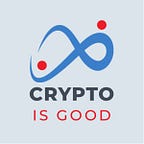How to ‘Do Your Own Research’ on DeFi and NFTs
It’s important to understand why you are supporting a given project.
I’m Daniel; I run Crypto Is Good, a consultancy with an emphasis on ICP. I became interested in crypto almost three years ago, and took advantage when Ethereum was listed at $180, Polkadot at $7, and Bitcoin at $15,000. Those opportunities pale in comparison to what is happening in DeFi and NFTs. Yield farming, staking, liquidity mining, and lending protocols have created a wealth of new use cases within crypto, while NFTs are generating value as they go mainstream.
Crypto development has gained hard-earned adoption and credibility. But where there is value, there is opportunity for scams, and you can lose everything if you’re not careful. My experience has taught me three very important lessons.
- Join the project’s Discord/Telegram groups and talk to people. Astroturfing uses fake activity to create the illusion of grassroots momentum. It takes little time to programmatically look up all crypto-related videos by hashtag, create dozens of burner accounts on TikTok, and spread promotional lies about a project. This is why it’s crucial to do your own research. But DYOR doesn’t mean watching YouTube videos. Influencers are great and all, but we’re not journalists, and we make mistakes. If you want to avoid scams, you need to find a way to get real information, and you need to figure out a strategy that works for you. For me, that strategy is networking. You should also review the documentation, and if you understand it, read the code.
- Learn to distinguish between pure hype and a solid roadmap. It’s a simple fact that many questionable projects in this space are driven by hype rather than vision, which can determine the fate of a project. Take Pudgy Penguins, for example. If you were a good community citizen, then you would have joined the Pudgy Penguins Discord and seen big influencers asking questions before they bought. If you were smart, you would have also noticed that the project’s roadmap was all about creating hype. A questionable project has a roadmap that just builds hype. A promising project has a roadmap that builds a genuine enterprise or ecosystem. It is important to differentiate between the two.
- Ask for more from anonymous teams. When a team is anonymous, it creates an imbalanced power structure. An anonymous team can potentially rug at any moment, or ignore you and your concerns, and there is nothing you can do. This doesn’t mean that an anonymous team’s project cannot prove to be worthwhile, but you can protect yourself by having high standards for your participation. My rules for an anonymous project are as follows: a.) They must have a working product, b.) they must be exceptionally knowledgeable, and c.) they must have a KOL (key opinion leader) supporting them.
In “A Guide on How to Know Which NFT to Buy,” published on ICPSquad’s Dfinity Community website, Alex Kantrowitz notes a few helpful tips for avoiding scams that I’ll add here:
• Projects shouldn’t be asking you to send money to a wallet with the promise of getting something in return. You should receive something at that moment. If you are supporting a project through presales, make sure it is a reputable project. For example, with three NFT collections already available on Entrepot, a new presale is a safe bet. They’ve always delivered so far, and there is no reason to believe that would change. Other projects like Team Bonsai are using CrowdFund NFT. This site guarantees that if the funding is not completed in 60 days, you get your money back (less the .0001 ICP transaction fee), so this is also a safe way to get in on a presale.
• Get to know the team. See if they have an artist on the team or if they just paid someone on Fiverr to create the art. A freelance artist doesn’t guarantee a scam, but it shows that there is no artist with a reputation to uphold connected to the project. So be sure to learn about the developers. They don’t have to be doxed, but they should be transparent with their processes.
• Rely on known players in the space. Sure, everyone will probably be fooled by some project eventually, but if they have passed the vetting performed by marketplaces or by a community like DC, then you have a much better chance of it being a legit project.
• Be cautious about any third-party site that requires you to connect your wallet.
As DeFi and mass ecosystem tokenization become fully operational on the Internet Computer, along with increased NFT volume from new launches and marketplaces, it’s important to understand why you are supporting a given project. Be skeptical of claims that you do not comprehend, and learn more until you do. If you manage your expectations, keep yourself engaged and informed, and maintain the perspective that most of these projects won’t change the world, then your experience will be worthwhile.
____
